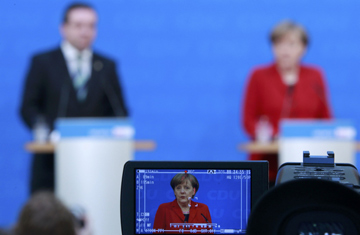
German Chancellor and leader of the Christian Democratic Union (CDU) Angela Merkel is pictured through a TV camera viewfinder as she and Stefan Mappus (left) top candidate of the CDU in the Baden Württemberg state election hold a news conference in Berlin March 28, 2011.
The votes are still being counted after Sunday's election in the key German state of Baden Württemberg, but already the results are clear. A surging Green Party, buoyed by anti-nuclear sentiment in the wake of Japan's nuclear crisis, has won an historic victory against Angela Merkel and her conservative-liberal coalition, leaving analysts wondering if this is the beginning of the end for Germany's weakened chancellor.
The short answer: Merkel is down, but not out — yet.
On Sunday, Merkel's Christian Democratic Union (CDU) lost control of the southwestern state of Baden Württemberg — a prosperous state that is home to Mercedes Benz, Porsche and software giant SAP — where the conservative CDU has ruled for 58 years. Compounding Merkel's misery is the fact that it was not the CDU's traditional rival, the center-left Social Democrats (SPD), who came out on top but the Green Party, which will now lead a state government for the first time in the party's 30-year history. Meanwhile, the Free Democrats (FDP), Merkel's partner in her fractious coalition in Berlin, barely cleared the 5% hurdle to reenter the Baden Württemberg state legislature.
Adding insult to injury, Merkel's CDU also suffered defeat in neighboring Rhineland Palatinate, a state that was once a CDU stronghold but where the SPD on Sunday was handed its fifth consecutive election victory. The good news for the SPD was tempered by the loss of its absolute majority, forcing the party into a coalition with the Greens. The Greens were not represented in Rhineland Palatinate's parliament in the last legislative period and now re-enter the state parliament with 15.4% of the vote. The FDP was hit hard and crashed out of the Rhineland Palatinate state parliament.
"It was a very painful day for the CDU in Baden Württemberg," Merkel told reporters on Monday. "We got through to the people, but then the debate over Japan, in connection with Fukushima was very difficult for us. We will not be able to deal with this pain in one day."
Commentators from Germany's leading newspapers were quick to blame Merkel and the fractious image of her ineffectual coalition with the FDP. But they also pointed out that the dramatic losses in the CDU's former strongholds show that the party has lost its political bearings and now appears weak and fractured. "Merkel looks exhausted. Nobody believes she can come up with the strength again to pull herself out of the deep hole she's fallen into in the past months," wrote the business daily Handelsblatt in a morning-after commentary on March 28.
That sentiment was shared by many of Germany's leading conservative commentators. The Frankfurter Allgemeine Zeitung noted that Merkel's ruling coalition has had to struggle from its first day in office two years ago. "[Now] there is an air of desperation to its actions," the paper wrote. "The desire for change is prevailing." The paper added that in these times of uncertainty, marked by a precarious global economy and events in Japan and North Africa, "resolve is in demand" from political leaders. "When that is lacking, people look elsewhere."
For now, the election debacle in Germany's hinterland has taken over national debate, but the next general election is not until 2013 and that could leave Merkel sufficient time to recover. "In the short term, Merkel is clearly damaged by the election results," says Oskar Niedermayer, political scientist from Berlin's Free University. "She has lost a lot of credibility. But ... if she can win back some of that credibility — and if the situation in Japan does not get worse — this could all be forgotten in two years from now."
Merkel is under increasing pressure from within the CDU after a series of missteps. Triggered by Japan's nuclear crisis, Merkel's about-face on nuclear power was seen by many as a thinly veiled tactical maneuver ahead of Sunday's elections. Germany's decision to abstain from a vote on military action against Libya in the United Nations Security Council deeply upset CDU conservatives. Volker Rühe, a former German defense minister under Helmut Kohl, called Germany's abstention a "serious mistake of historic dimensions."
Yet, even as dissatisfaction with Merkel grows within her party, it is unlikely that she will suddenly be swept from power. During her steady rise from "Kohl's girl," a protégé of the chancellor of German unity who later inherited his throne, Merkel has successful sidelined every serious inner-party rival. "Merkel is not threatened from within the party, even though she was the strongest advocate for nuclear power at the federal level," says Gerd Langguth, a political scientist from the University of Bonn. "There simply is not anyone left who could rise up to challenge her."
More worrying for Merkel than the grousing of the old men in the CDU is likely the even more disastrous state of the FDP, until now the CDU's only viable coalition partner. An experiment to govern with the Greens in the state of Hamburg ended in a bitter election defeat, but Merkel's survival beyond 2013 may depend on whether she can remold her party to make a still unlikely marriage of Christian Democrats and Greens at the federal level a possibility.
Chances are that over the next few months, Merkel may develop a new mantra: Green is good.
